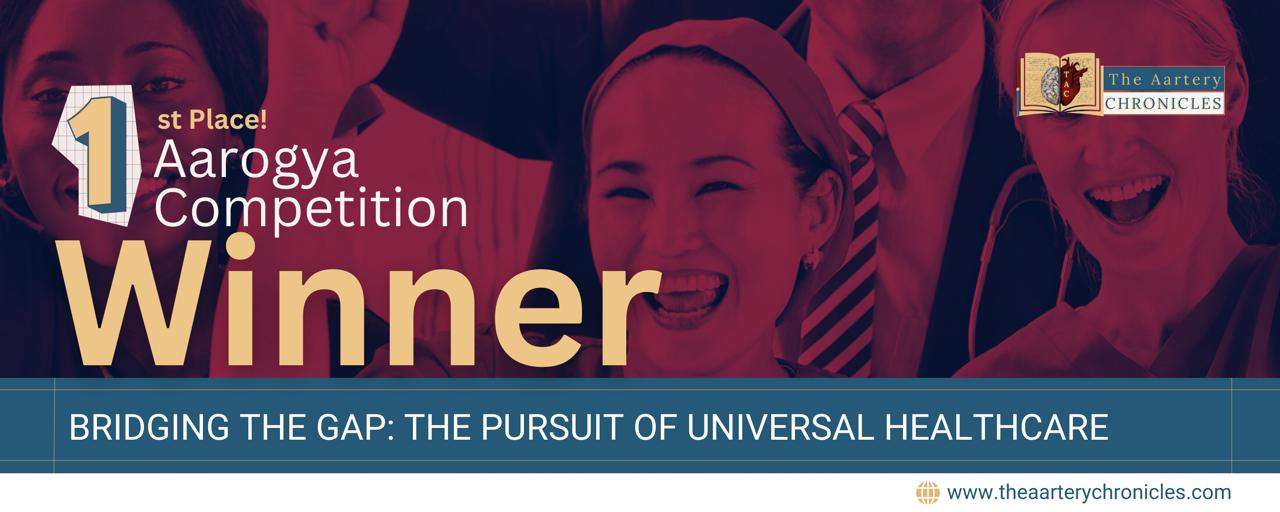

Bridging the Gap: The Pursuit of Universal Healthcare
Introduction: Universal Healthcare as a Human Right
The idea of universal healthcare isn’t just a noble aspiration; it’s a fundamental human right [1]. The world has made remarkable strides in healthcare, but the road to universal access remains a formidable challenge in many nations. This pursuit is not just about policies and numbers; it’s about creating a world where everyone, regardless of their background or circumstances, can access the care they need.
When we discuss universal healthcare, we’re not merely debating a policy; we’re advocating for a transformative change that has the potential to impact millions of lives. The primary objective of this endeavour is to champion universal healthcare access, sparking conversations about the policies, challenges, and the urgent need for equitable healthcare [2].
The Reality of Inequity in Healthcare Access
Inequity in healthcare access is a stark reality, documented by organizations like the World Bank [3]. Disparities persist, leaving vulnerable populations without the care they deserve. It’s a reality where one’s ability to receive medical attention is often determined by their socioeconomic status, creating a chasm in our society that needs to be bridged.
People living in low-income or marginalized communities often face insurmountable barriers to healthcare. This can mean the difference between life and death in extreme cases. Without intervention, this gap continues to widen, further disadvantaging those who need help the most.
Universal Healthcare Advocacy: A Solution to Inequality
Universal healthcare advocacy isn’t just a dream. It’s a solution to this inequality.
- It means creating healthcare systems that cater to the needs of all individuals, irrespective of their economic background or life circumstances.
- It’s about tearing down the barriers that separate people from the care they require.
The push for universal healthcare represents a call to action for global leaders and policymakers. It emphasizes the need to prioritize health over profits and to see access to healthcare as an essential element of human dignity.
The Tangible Impact of Universal Healthcare on Individuals and Communities
To truly appreciate the importance of this advocacy, we must consider the impact it could have on individuals and communities.
- It means a mother can take her child to the doctor without worrying about the cost.
- It means a worker can receive treatment without fearing medical bills that could plunge them into debt.
- It means providing preventive care that saves lives and eases the burden on healthcare systems.
By ensuring access to timely and appropriate care, universal healthcare has the potential to improve the overall health of populations, reduce healthcare costs in the long run, and create a more productive society. It leads to healthier families, stronger communities, and a more resilient global health system.
The Challenges and Complexities of Achieving Universal Healthcare
Achieving universal healthcare isn’t a simple task, and the path is riddled with complexities [4]. Financing, infrastructure, and policy changes are all part of the equation. Health systems need to be strengthened, and the disparities between rich and poor countries must be addressed to ensure that everyone benefits equally.
- There are questions surrounding how to fund such a system sustainably, especially in developing nations.
- Furthermore, logistical challenges in remote areas and healthcare infrastructure disparities between urban and rural regions present additional hurdles.
However, history has shown us that it’s possible. Some nations around the world have made strides towards universal healthcare, demonstrating that this ambitious goal is attainable.
Learning from Global Success Stories
In the pursuit of universal healthcare, we must come together as a global community to share knowledge, experiences, and best practices [5]. Countries like the United Kingdom, Canada, and several European nations have achieved universal healthcare or are well on their way to doing so. Their successes provide valuable lessons for other nations aspiring to do the same.
By learning from the experiences of these countries, including both their achievements and challenges, we can create more effective and inclusive healthcare systems that meet the needs of all people.
Conclusion - A Moral Imperative for Healthcare Access
The advocacy for universal healthcare isn’t just a policy debate; it’s a moral imperative. It’s about striving for a world where healthcare is not a luxury but a right. It’s about addressing the disparities that exist in healthcare access and working tirelessly to close that gap. Universal healthcare isn’t just a dream; it’s a vision of a more equitable, healthier world for all.
- Ruger, J. P. (2015). Universal Health Coverage and the Right to Health: From Legal Principle to Post-2015 Indicators. International Journal of Health Services, 45(3), 495-506.
- World Health Organization. (2020). Universal health coverage. https://www.who.int/health-topics/universal-health-coverage
- World Bank. (2021). Universal Health Coverage: The World Bank Group’s Approach. https://www.worldbank.org/en/topic/health/brief/universal-health-coverage
- World Health Organization. (2010). The World Health Report - Health systems financing: the path to universal coverage. https://www.who.int/whr/2010/en/
- Kutzin, J. (2013). Anything goes on the path to universal health coverage? World Health Organization. https://www.who.int/bulletin/volumes/91/1/12-113654/en/

Hafsahbanu Patel
MRes Medical Student
University of Lancashire
Uniki Bishkek








